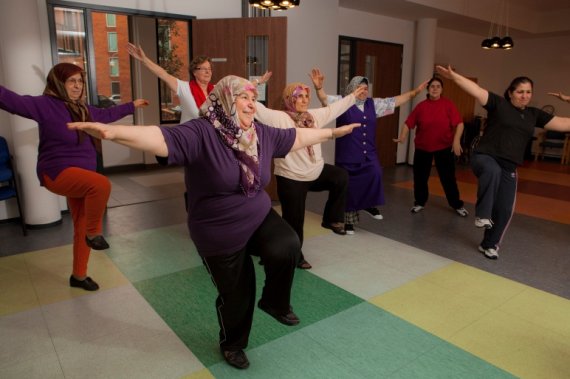Throughout one and a half year Herens followed 270 people from 19 exercise groups in Amsterdam, The Hague, Rotterdam, Tilburg, Helmond, Hengelo and Enschede. ‘Two thirds are of non-Dutch origin – with 29 different countries of origins – half have only followed primary school and a little less than half have low incomes’, Herens’s summary of the profile of the participants of the exercise programmes she studied.
Health differences
One of the aims of neighbourhood exercise programmes is to reduce the health discrepancies between people from higher and lower socio-economic classes. The assumption is that people from low socio-economic classes get less exercise than the average Dutch citizen. ‘But I haven’t been able to find any evidence for that,’ says Herens. ‘Apparently the people that come here – participation is voluntary – already have some feeling with exercise or sport. So the question remains whether exercise programmes also reach the less active people.’ Another striking finding was that the participants do not start getting more exercise when they take part in a programme. Herens did find that the people who got more exercise in their free time – such as in the exercise classes – felt healthier and enjoyed exercise more than those who had dropped out of the exercise programme. The dropouts also turned out to have more health problems and a higher BMI one year later than those who continued.
Furthermore, the people who took part in a short programme of 10 to 12 weeks also scored lower than those who took part in continuous programmes, notes Herens. ‘The assumption is often that once they start exercising they’ll carry on exercising. But that’s not how it works for this group. These people do not go on to join in the regular sports activities in the neighbourhood.’
Group lessons
Specifically for women of the non-western origin, Herens found some factors which cause that they continue coming to these group lessons. ‘From the interviews which we had about this, individuals factors came up, such as their body became more flexible, they have less pain, and they feel fitter and more energetic. Besides this they find it important that they have a nice group: helping each other, learning together and having fun. A skilled and responsive exercise teacher plays a key role in this.’
Partly because of the talks Herens also found that the socially vulnerable are really not as difficult to reach as often claimed. ‘They are certainly approachable, as long as you make yourself visible for them and you are personally involved. This costs a lot of time, but then you also receive a wealth of information.’

